Castor oil has been used for centuries as a natural remedy for various health and beauty issues. This versatile oil comes from the castor bean plant and is known for its unique properties. People use it for many things, from helping hair grow to easing stomach problems.

Castor oil offers many benefits for skin, hair, and health that are backed by science and user experiences. It’s easy to find and can be a useful addition to your daily routine. This article will explore 13 ways castor oil can improve your life, especially when used before bed.
1) Promotes Hair Growth

Castor oil has gained popularity as a natural remedy for hair growth. This thick, viscous oil contains ricinoleic acid, a fatty acid that may help improve blood flow to the scalp.
Better circulation can nourish hair follicles, potentially leading to healthier and stronger hair. Some people claim that regular use of castor oil can boost hair growth significantly.
The oil’s moisturizing properties may also benefit the scalp. A well-hydrated scalp can create a better environment for hair to grow. Castor oil can help reduce dryness and irritation, which might otherwise hinder hair growth.
While scientific evidence is limited, many users report positive results. Some say they’ve seen improvements in hair thickness and length after using castor oil regularly.
To try it, apply a small amount of castor oil to your scalp and massage gently. Leave it on for a few hours or overnight before washing. Consistent use over time may yield the best results.
2) Moisturizes Skin
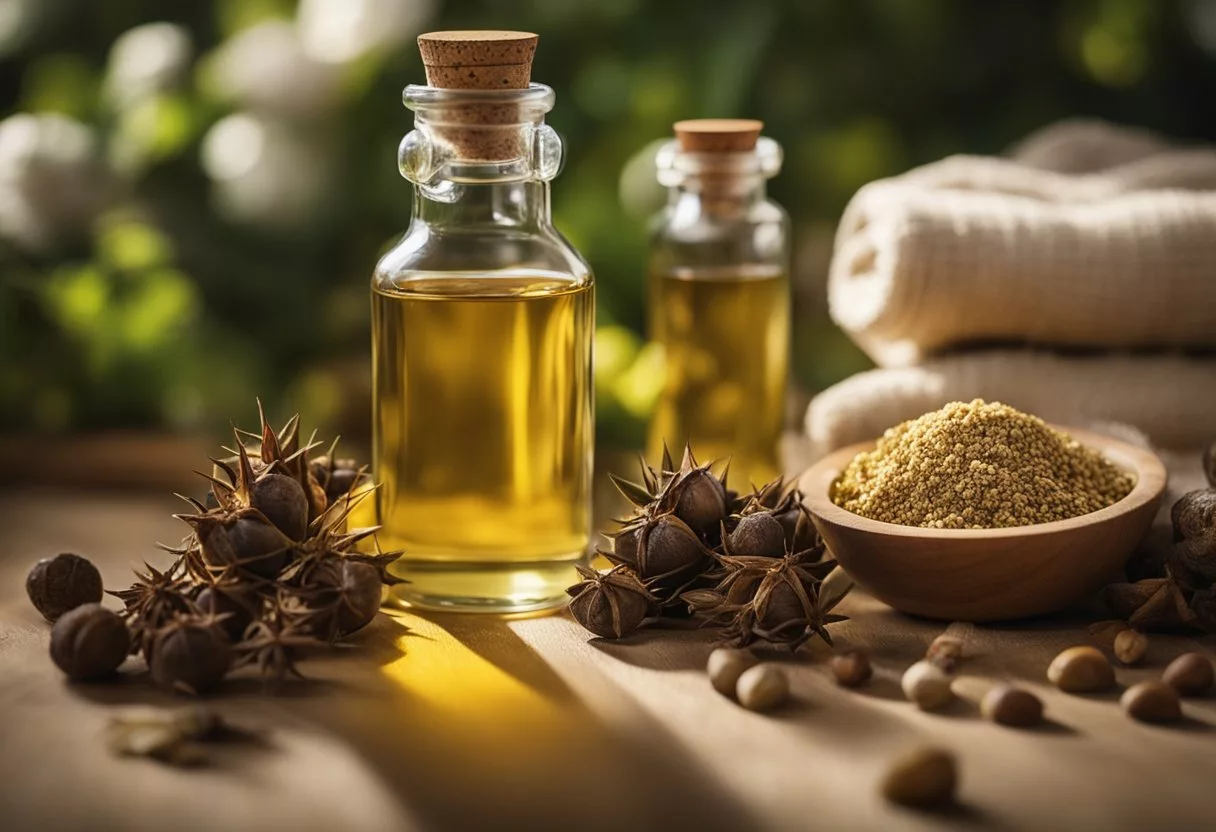
Castor oil is a powerful moisturizer for the skin. Its thick, oily texture helps lock in hydration and prevent water loss from the skin’s surface.
The oil contains ricinoleic acid, a fatty acid that penetrates deep into the skin layers. This helps keep skin soft and supple for extended periods.
Castor oil can be especially beneficial for dry or rough areas like elbows, knees, and heels. It creates a protective barrier that shields these areas from further drying out.
For those with sensitive skin, castor oil is generally well-tolerated. It rarely causes irritation when applied topically.
To use castor oil as a moisturizer, mix it with a carrier oil like jojoba or almond oil. This makes it easier to spread and absorb.
People with oily skin can still benefit from castor oil’s moisturizing properties. Just use it sparingly or dilute it more heavily with other oils.
Regular use of castor oil can help improve skin texture and tone over time. This leads to smoother, more radiant-looking skin.
3) Fights Skin Infections
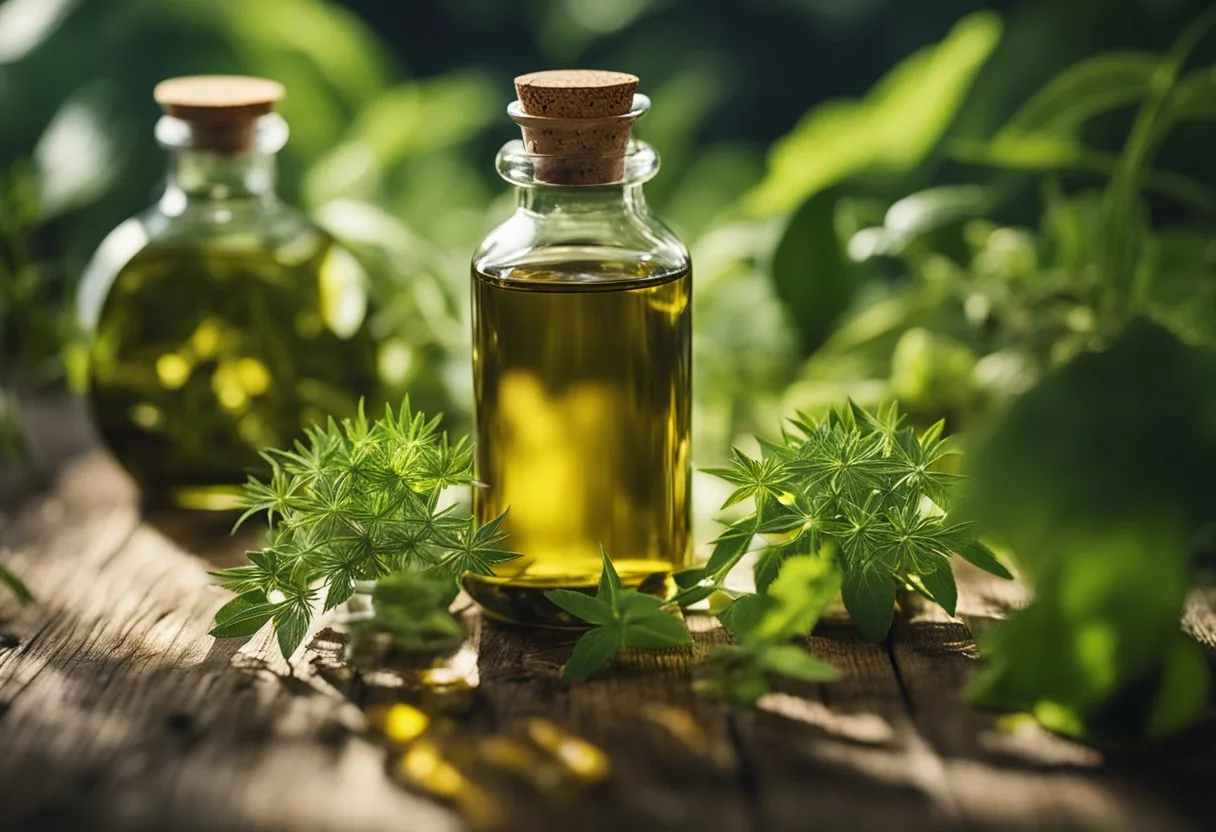
Castor oil has natural antibacterial and antifungal properties that can help fight skin infections. Its main component, ricinoleic acid, shows promise in combating harmful microorganisms on the skin’s surface.
When applied topically, castor oil can create a protective barrier against bacteria and fungi. This barrier helps prevent these organisms from multiplying and causing further infection.
The oil’s anti-inflammatory properties may also reduce redness and swelling associated with skin infections. This can help alleviate discomfort and promote faster healing.
For minor skin infections, a thin layer of castor oil can be applied directly to the affected area. It’s important to clean the skin thoroughly before application to maximize effectiveness.
Regular use of castor oil may help prevent recurring skin infections by maintaining the skin’s natural protective barrier. However, it’s crucial to consult a healthcare professional for severe or persistent infections.
4) Reduces Acne
Castor oil can be a helpful tool in fighting acne. Its unique properties make it effective against breakouts and blemishes.
The oil contains ricinoleic acid, which has antimicrobial properties. This acid helps fight the bacteria that often cause acne.
Castor oil also has anti-inflammatory effects. It can reduce redness and swelling associated with acne breakouts.
Despite being an oil, castor oil is non-comedogenic. This means it won’t clog pores, which is important for acne-prone skin.
A study in the Journal of Cosmetic Dermatology found that applying castor oil topically reduced acne lesions in participants. This suggests it may be an effective natural treatment for acne.
To use castor oil for acne, people can apply a small amount to problem areas before bed. It’s best to start with a patch test to ensure no skin reactions occur.
5) Boosts Immune Function

Castor oil may help strengthen the immune system. It contains ricinoleic acid, which has anti-inflammatory properties that can support the body’s defense mechanisms.
Applying castor oil to the skin may improve lymphatic drainage. This process helps remove toxins and waste from tissues, supporting overall immune function.
Some people use castor oil packs to potentially enhance immune activity. These packs involve applying castor oil to the skin and covering it with a cloth.
Castor oil might also help balance gut bacteria when taken orally. A healthy gut microbiome is crucial for a strong immune system.
Regular use of castor oil may support thymus gland health. The thymus gland plays a key role in producing T-lymphocytes, important cells in the immune response.
While more research is needed, many people believe castor oil can improve various immune system functions. It’s important to use high-quality, cold-pressed castor oil for the best potential benefits.
6) Relieves Constipation

Castor oil is known for its laxative effects and can help relieve constipation. It works as a stimulant laxative, which means it triggers the muscles in the intestines to move.
When taken orally, castor oil can promote bowel movements within a few hours. Adults and children over 12 can take 1 to 4 tablespoons per day for occasional constipation relief.
The oil’s main component, ricinoleic acid, helps reduce inflammation in the digestive system. This can create a healthier environment for regular bowel movements.
Some people apply castor oil packs to their abdomen to ease constipation. This involves soaking a cloth in castor oil and placing it on the stomach for 30-60 minutes.
It’s important to note that while castor oil can be effective, it should not be used long-term for constipation. Overuse may affect the bowel’s natural ability to function properly.
As with any remedy, it’s best to consult a healthcare provider before using castor oil for constipation, especially for children or pregnant women.
7) Induces Labor
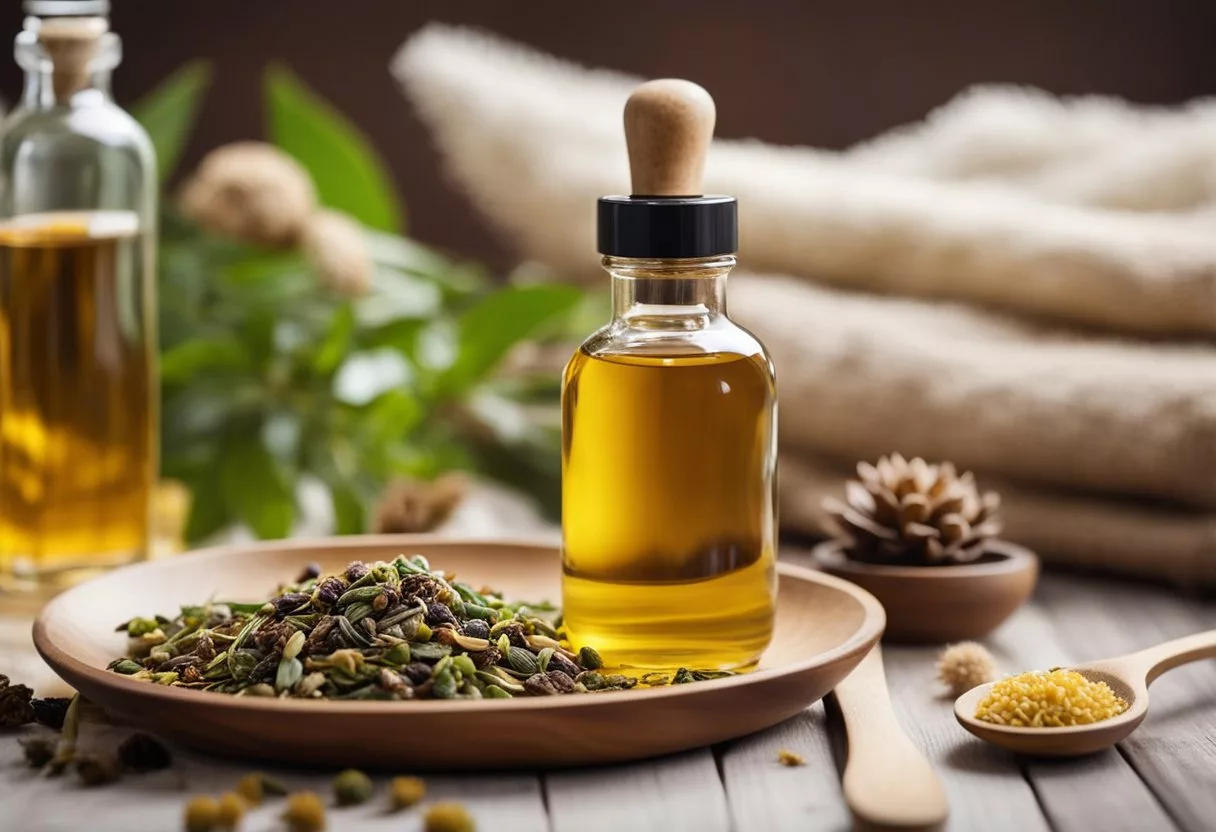
Castor oil has a reputation for inducing labor in pregnant women. Some people believe it can help start contractions and speed up delivery. The oil acts as a strong laxative, which may stimulate the bowels and uterus.
Studies on castor oil’s effectiveness for labor induction have mixed results. Some research suggests it might work for some women, but not for others. The exact mechanism is not fully understood.
Using castor oil to induce labor comes with risks. It can cause nausea, vomiting, and diarrhea. These side effects can lead to dehydration, which is dangerous during pregnancy and labor.
Pregnant women should never take castor oil without talking to their doctor first. The recommended dose is no more than 1-2 tablespoons in a 24-hour period. Drinking plenty of water is important to prevent dehydration.
It’s crucial to note that inducing labor before 40 weeks can be risky for the baby. Natural methods like castor oil should only be considered under medical supervision and at full term.
8) Reduces Joint Pain

Castor oil may help reduce joint pain and inflammation. Its main component, ricinoleic acid, has natural anti-inflammatory properties. When applied to sore joints, castor oil can penetrate deep into the skin.
The oil targets the source of pain and may provide relief from conditions like arthritis. Massaging castor oil into affected areas can improve blood circulation, which may further ease discomfort.
Some people find that castor oil helps relieve stiffness in their joints. This can make movement easier and less painful. The oil’s soothing properties may also help reduce swelling around joints.
For best results, castor oil can be applied directly to painful joints before bed. This allows the oil to work overnight while the body is at rest. Regular use may lead to noticeable improvements in joint comfort and flexibility.
While more research is needed, many people report positive experiences using castor oil for joint pain relief. It offers a natural alternative to some over-the-counter pain medications.
9) Improves Nail Health

Castor oil can work wonders for nail health. It contains nutrients that help strengthen nails and promote growth.
The oil is rich in ricinoleic acid, which has antifungal properties. This can help protect nails from infections and keep them healthy.
Applying castor oil to nails and cuticles can soften them and reduce brittleness. This makes nails less likely to break or chip.
Many people find that regular use of castor oil leads to stronger, healthier nails. Some even report faster nail growth.
To use castor oil for nails, simply massage a few drops into the nails and cuticles. Leave it on for 10-15 minutes before washing off.
For a deeper treatment, try a castor oil nail soak. Mix castor oil with warm water and soak nails for 15-20 minutes.
Consistent use is key. Apply castor oil to nails a few times a week for best results. Over time, many people notice their nails become stronger and look healthier.
10) Treats Dandruff
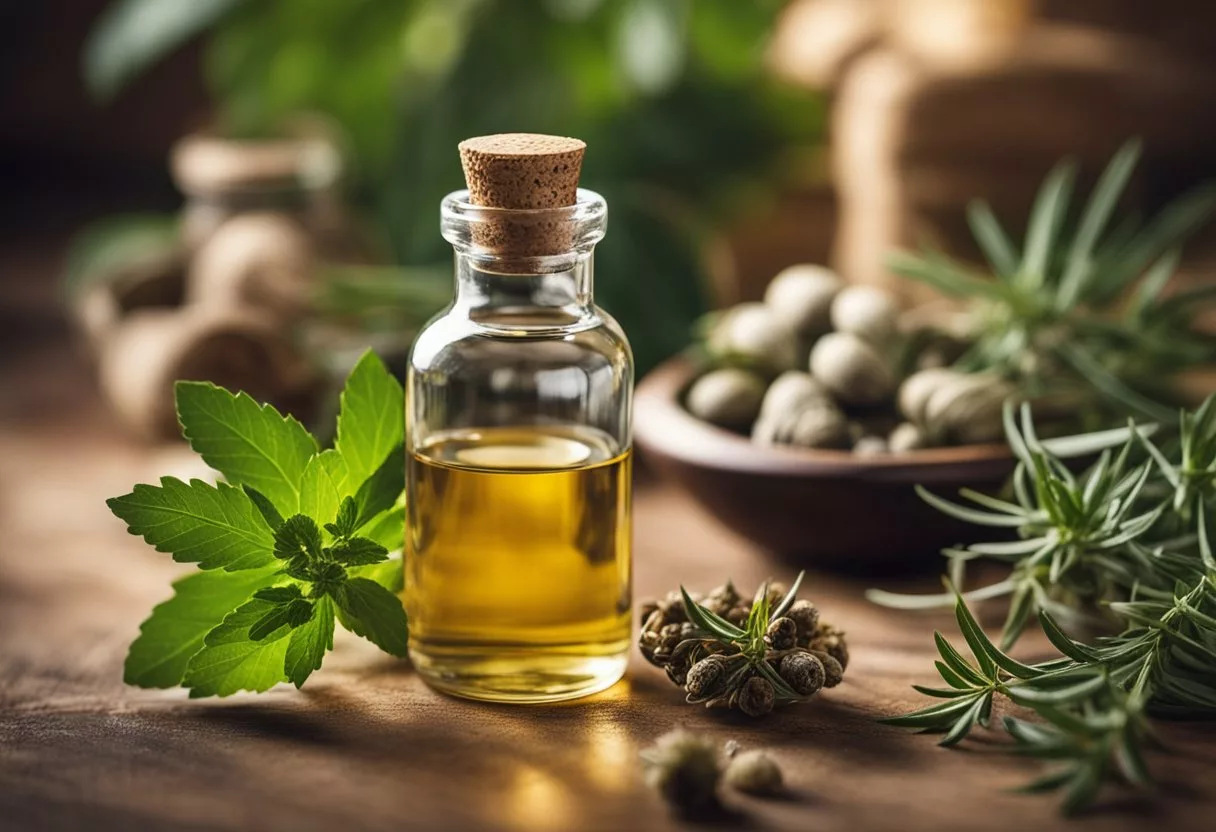
Castor oil can be helpful in managing dandruff. It has moisturizing properties that may reduce scalp dryness, a common cause of flaking.
The oil’s antifungal qualities might also combat dandruff caused by fungal growth. Castor oil can restore moisture to the scalp, potentially easing irritation and itching.
To use castor oil for dandruff, mix it with other ingredients. One option is to combine it with aloe vera gel and tea tree oil. This blend may help fight flakes and soothe the scalp.
It’s important to note that castor oil alone cannot prevent or treat dandruff. For best results, use it alongside medicated shampoos containing active ingredients like zinc pyrithione.
Regular application of castor oil may improve overall scalp health. This can lead to reduced dandruff over time. Remember to wash the oil out thoroughly to avoid buildup.
11) Heals Scars

Castor oil has gained attention for its potential to heal scars. The ricinoleic acid present in castor oil may help reduce the appearance of scars and promote skin healing.
People use castor oil on various types of scars, including those from injuries, surgeries, and acne. The oil’s moisturizing properties can soften scar tissue and improve skin elasticity.
To use castor oil for scars, gently massage it into the affected area. Some people apply castor oil to their scars for up to 24 hours a day, taking breaks only for showers.
Consistency is key when using castor oil for scar treatment. Regular application over time may lead to noticeable improvements in scar appearance.
While results can vary, many individuals report positive outcomes when using castor oil on their scars. It’s important to note that older, more established scars may be more resistant to treatment than newer ones.
Before applying castor oil to scars, it’s wise to perform a patch test to check for any skin reactions. If irritation occurs, discontinue use and consult a healthcare professional.
12) Prevents Stretch Marks
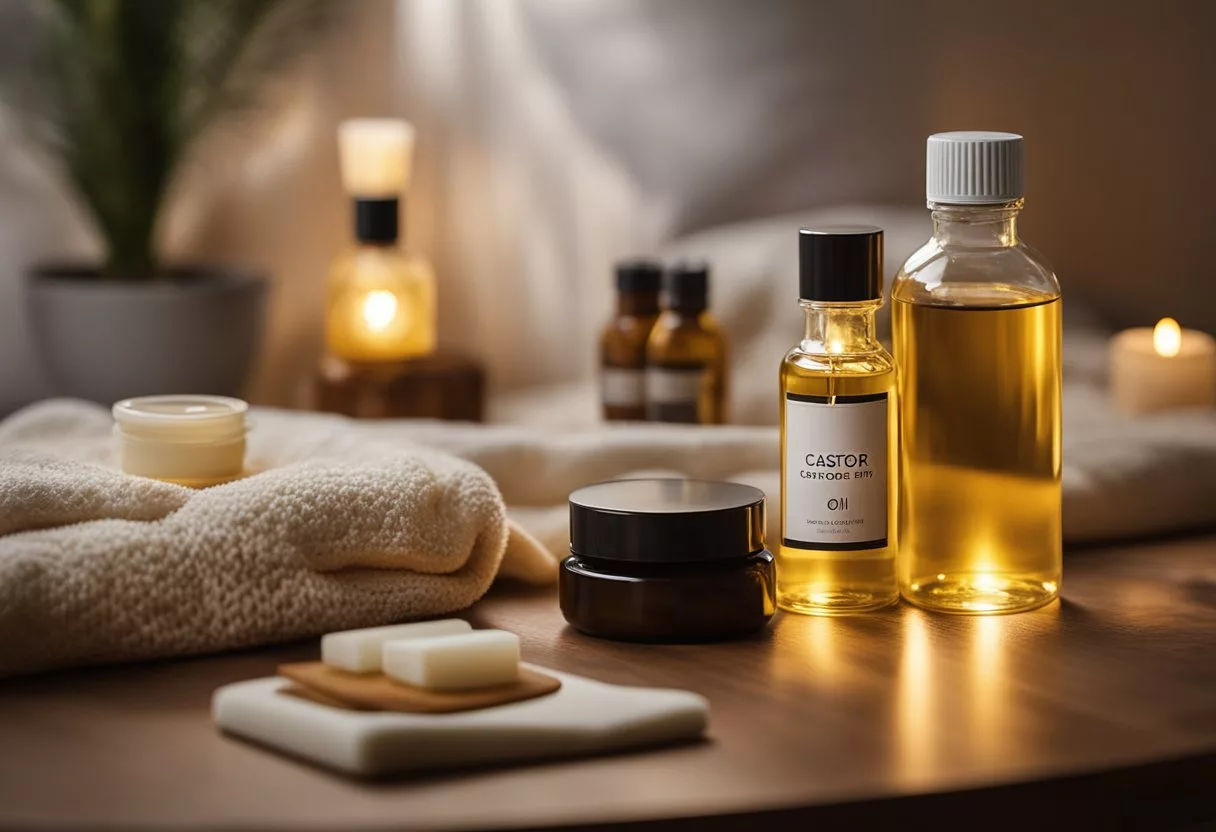
Castor oil can help prevent and reduce stretch marks. Its rich fatty acids penetrate deep into the skin, promoting collagen production and improving skin elasticity.
Regular application of castor oil may help fade existing stretch marks over time. Massaging castor oil into affected areas for about 15 minutes can be effective.
For best results, people can apply castor oil to stretch mark-prone areas before bedtime. This allows the oil to work overnight while the skin repairs itself.
Some users mix castor oil with other beneficial oils like coconut or sweet almond oil for added skin benefits. This combination can enhance moisture retention and nourishment.
Consistency is key when using castor oil for stretch marks. Regular application over time may lead to improved skin texture and a gradual reduction in the appearance of stretch marks.
While castor oil can be helpful, it’s important to have realistic expectations. Results may vary, and it may take time to see noticeable improvements in stretch mark appearance.
13) Stimulates Eyelash Growth

Castor oil has gained popularity as a natural remedy for eyelash growth. This thick, viscous oil contains ricinoleic acid, which may help nourish and strengthen lashes.
Castor oil can promote lash growth by providing nutrients to the hair follicles. It may also help protect existing lashes from breakage, making them appear fuller and longer.
To use castor oil for eyelashes, apply a small amount to clean lashes before bed. Use a clean mascara wand or cotton swab for easy application.
While scientific evidence is limited, many people report positive results. Castor oil can make lashes appear thicker and more lustrous, even if it doesn’t directly stimulate growth.
It’s important to use pure, cold-pressed castor oil and do a patch test before applying it near your eyes. If irritation occurs, discontinue use and consult a doctor.
Consistency is key when using castor oil for eyelash growth. Regular application over several weeks may lead to noticeable improvements in lash appearance and health.
Overview of Castor Oil Benefits

Castor oil has been used for centuries and offers many potential health and beauty benefits. Recent scientific studies have provided support for some of its traditional uses.
Historical Uses of Castor Oil
Castor oil has a long history dating back to ancient Egypt. People used it as a natural remedy for various ailments. In ancient times, castor oil was applied to treat skin conditions and promote hair growth.
It was also taken internally as a laxative. Many cultures incorporated castor oil into traditional medicine practices. The oil was believed to have healing properties for joint pain, digestive issues, and wounds.
Scientific Support for Castor Oil Benefits
Modern research has found evidence to support some traditional uses of castor oil. Studies show it may help with:
- Constipation relief
- Promoting hair growth
- Moisturizing dry skin
- Reducing inflammation
The fatty acids in castor oil, especially ricinoleic acid, are thought to be responsible for many of its effects. Some studies indicate castor oil may have antimicrobial properties. This could explain its historical use for treating skin infections.
Research also suggests castor oil may boost the immune system when applied topically. While more studies are needed, initial findings are promising for several potential benefits of this versatile oil.
How to Apply Castor Oil for Best Results
Proper application is key to getting the most out of castor oil. The right techniques can boost its effects on skin and hair. Let’s look at some effective methods for both.
Skin Application Techniques
Start with clean, dry skin. Use a small amount of castor oil – a little goes a long way. Warm the oil between your palms. This makes it easier to spread. Gently massage the oil into your skin using circular motions.
For dry spots, focus on problem areas like elbows and heels. Apply before bed for best results. Cover treated areas with soft cloth or socks to keep sheets clean.
Mix castor oil with a lighter oil for easier application. This works well for larger body areas. Try a 1:1 ratio with coconut or jojoba oil. Always do a patch test first, especially if you have sensitive skin.
Hair Application Methods
For hair growth, focus on the scalp. Part your hair into sections. Apply castor oil directly to your scalp with your fingertips. Gently massage for 5-10 minutes to boost blood flow.
For conditioning, work a small amount through your hair from roots to ends. Use a wide-tooth comb to distribute evenly. Put on a shower cap and leave overnight for deep treatment.
Rinse thoroughly with shampoo to remove all oil. You may need to wash twice. Use weekly for best results. For daily use, mix a few drops into your regular conditioner.
Frequently Asked Questions
Castor oil offers numerous benefits for skin, hair, and health when applied topically or taken orally. It can relieve pain, moisturize skin, and promote healing.
What are the potential benefits of applying castor oil to the skin?
Castor oil moisturizes skin and fights infections. It helps reduce acne and promotes a healthy complexion.
The oil’s antimicrobial properties can speed up wound healing for minor cuts and scrapes.
Can oral consumption of castor oil offer any health advantages?
Oral castor oil can relieve constipation as a natural laxative. It may also help induce labor in pregnant women at full term.
Castor oil contains ricinoleic acid, which has anti-inflammatory effects when consumed.
How does castor oil aid in relieving pain when used topically?
The ricinoleic acid in castor oil has anti-inflammatory properties. When applied to sore joints or muscles, it can help reduce pain and swelling.
Massaging castor oil into affected areas may improve circulation and ease discomfort.
Is there any benefit to using castor oil on the stomach area?
Applying castor oil to the stomach may help with digestive issues. It can reduce bloating and gas when massaged into the abdomen.
Some people use castor oil packs on the stomach to support detoxification and liver health.
What are the possible side effects associated with using castor oil?
Topical use of castor oil is generally safe, but it may cause skin irritation in some people. Oral consumption can lead to nausea, cramping, or diarrhea.
Pregnant women should avoid taking castor oil orally without medical supervision.
How should castor oil be applied to the face for overnight treatment?
To use castor oil on the face overnight, apply a thin layer to clean skin. Focus on dry areas or acne-prone spots.
It’s best to do a patch test first to check for any adverse reactions. Rinse off the oil in the morning with warm water.